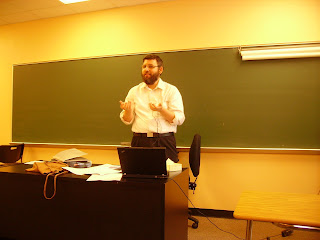 Yesterday, I attended YCT's seventh annual Yemei Iyun on Bible and Jewish Thought. This year it is being held at Ma'ayanot high school in Teaneck, NJ. The Yemei Iyun is being organized in conjunction with Beit Morasha of Jerusalem, Center for Modern Torah Leadership, Drisha Institute for Jewish Education, Lookstein Center for Jewish Education and Yeshivat Maale Gilboa. I've attended the Yemei Iyun every year since I've been in YCT and this year was no different.
Yesterday, I attended YCT's seventh annual Yemei Iyun on Bible and Jewish Thought. This year it is being held at Ma'ayanot high school in Teaneck, NJ. The Yemei Iyun is being organized in conjunction with Beit Morasha of Jerusalem, Center for Modern Torah Leadership, Drisha Institute for Jewish Education, Lookstein Center for Jewish Education and Yeshivat Maale Gilboa. I've attended the Yemei Iyun every year since I've been in YCT and this year was no different.
The four sessions I attended yesterday began with Rabbi Aryeh Klapper's clever "Did Hevel Have a Sense of Humor?", which wasn't essentially about the title (although, for those interested, Cain was utterly sarcastic) and is well worth the listen when it gets uploaded to the YCT website.
The second session I attended was given by Rabbi Shmuel Klitsner on "Two Biblical Reactions to Catastrophe: An Intertextual Comparison between Genesis 9 and Genesis 19", which was interesting as he showed the similarities and what little differences there were between the instances of Noah and the unfortunate incident with his son Ham along with Lot and his daughters. One thing that bothered me, though, was that when Rabbi Klitsner considered Ham's sin to be either seeing Noah's nakedness, castrating Noah, or homosexually raping him, I then mentioned to him a fourth possibility: that Ham had sex with Noah's wife, as suggested in an article I read three weeks ago (John Sietze Bergsma and Scott Walker Hain, "Noah's Nakedness and the Curse on Canaan (Genesis 9:20-27)," JBL 124, no. 1 [Spring 2005]: 25-40) and he inexplicably swept it aside. Upon the completion of the lecture, I once again brought up the possibility and he once again swept it aside (although a lady in the front row did agree with me about it's plausibility). Anyways, aside from that, it was a good presentation (and there was another unrelated neat point about leadership he made).

The next talk I heard was by Rabbi Klapper again, this time on "Why Only Moses Could Unbury Joseph." This was a smart talk in which Rabbi Klapper essentially argued that Moses and Joseph were opposites: whereas Joseph started out as a shepherd (and living in Canaan), he dreamt of agriculture (an Egyptian thing), became more Egyptian, and became part of the bureaucracy [and helping to enslave people], Moses started out growing up an Egyptian within the bureaucracy but eventually discovered his Israelite identity, became a shepherd, and eventually freed slaves.
The last talk I heard was Rabbi Eric Levy speaking on "The Problem of the City of Shechem in Tanakh", which was surprisingly excellent. I'm not going to give away the punchline of this lecture (at least not in this posting), so you should wait for this to come out on the YCT audio page, once
it gets uploaded - it was excellent and I look forward to listening to more of Rabbi Levy's stuff (available on his website).
Okay - wondering what I'm going to hear today....
No comments:
Post a Comment